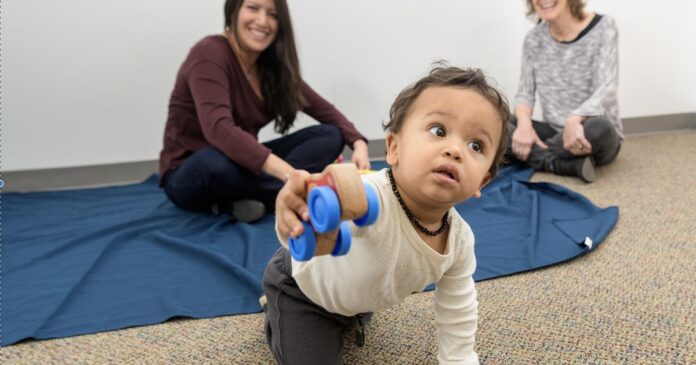A young mother sits on the floor in a motel room with her baby girl on her lap, her son milling around in the background. The mother taps the infant’s fist on a toy, as the baby dazes blankly, unengaged.
These moments were captured on video before the mother underwent a 10-session intervention for parents who have trouble bonding with their children because of challenges tied to poverty, homelessness and other issues. In a montage of clips filmed afterward, the woman can be seen snuggling the baby sleeping on her chest while she talks to and plays with her young son at her side. In another clip, the son dangles his arm around his mother’s shoulders as she jostles the baby in her lap.
There is life and love in the room.
“This mom continues to live in a motel room,” said Mary Dozier, a professor of psychological and brain sciences at the University of Delaware who developed the program. “We haven’t helped her with child care. We haven’t helped her with housing. We haven’t directly tried to change depression or anything else, and yet, these two children’s lives have fundamentally changed.”
Dozier has spent three decades studying the development of infants and young children. The home visiting program that she developed, dubbed ABC for Attachment and Biobehavioral Catch-Up, uses coaches who provide in-the-moment positive reinforcement to help parents learn to nurture a child, follow a child’s lead and avoid frightening behaviors. These skills are useful for anybody, but they are “especially important when children have experienced adversity or trauma,” Dozier said.
Through a series of studies coordinated with the Philadelphia Department of Health and Human Services, Dozier and a team of researchers identified children who were at risk of neglect and have followed their development for 15 years, examining the short- and long-term effects of the ABC program. This research has shown that the ABC program – now used in 26 states and 10 countries – improves children’s brain and behavioral development and helps them gain trusting, secure relationships with their parents. Studies have indicated that the easily-implemented ABC program improves children’s executive-functioning and self-control and that it regulates cortisol production, the stress-hormone that partly affects sleep.
“We see this everywhere we go, whether it’s when we implement it nationally and internationally or in a randomized trial,” said Dozier, the UNIDEL Amy E. du Pont Chair of Child Development at the University of Delaware. “We see the parents change. They become more sensitive. They follow the lead more of their child. We see the children’s attachment is more likely to be secure and organized.”
Currently, Dozier and her team have been researching how the ABC program impacts parents with substance use disorder. The $3.1 million, National Institutes of Health-funded study that began in 2020 and ends in 2026. It includes about 200 parents from Pennsylvania, New Jersey, Delaware and Maryland who are receiving treatment, such as the medications methadone or buprenorphine that help stem the cravings for and effects of opioids. Since opioids and other drugs interfere with brain receptors involved with the reward system, the natural rewards that come from bonding with a child and parenting may be affected.
“We (humans) are designed so that parenting will be rewarding, but that system gets disrupted when we have enough challenges in our life, either because of drugs or mental health issues or living in a motel room with three kids,” Dozier said. “So what you’ve got to do is change the system, tweak it so that eventually children can be become more rewarding, so that the process of parenting is itself rewarding.”
With the parents with substance use disorder in the ABC program, Dozier’s team has been placing electrodes on their heads to study brain activity as they look at pictures of babies and pictures of drugs.
“What we anticipate is that the baby would become relatively more important to them than the drug, if they’re in the … ABC intervention than if they’re not,” Dozier said. “But I don’t know the answer to that at this point.”
Helping parents learn to become more engaged with their children is necessary even before resolving substance use, stabilizing housing or other challenges because “babies can’t wait,” Dozier said.
No matter what situation the parents are in, coaches conducting the ABC intervention do not critique or correct parents’ actions. Instead, starting in the very first session, the coaches “are already trying to find something in what they’re (the parents) doing that is positive and pointing it out,” Dozier said.
The parent should feel supported by the ABC coach whose ongoing, positive reinforcement of what the parent is doing well elicits a “cascade of behaviors, and it makes parents really feel empowered. It makes them feel good about themselves,” Dozier said.
“I was 37, and I was a psychologist when I had my first child,” Dozier said. “If you had an expert come in to say they’re going to evaluate my parenting, I would have found that threatening. And so you can imagine what it would feel like for a 20-year-old who is using opioids.
“Everybody said, ‘How in the world could you possibly have a child? You have no business having a child.’ They’re (the parents) going to just feel so demeaned. So, the positive comments are just so critical in helping them feel rewarded by this process. And eventually, what we want is that they are rewarded by their baby and rewarded by parenting itself. We’re sort of scaffolding that process to get them to that point.”



